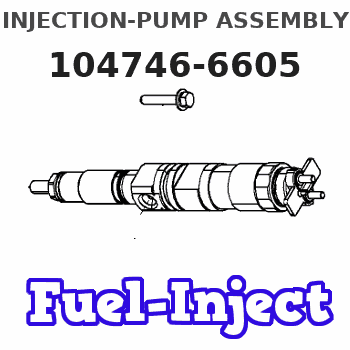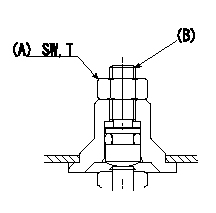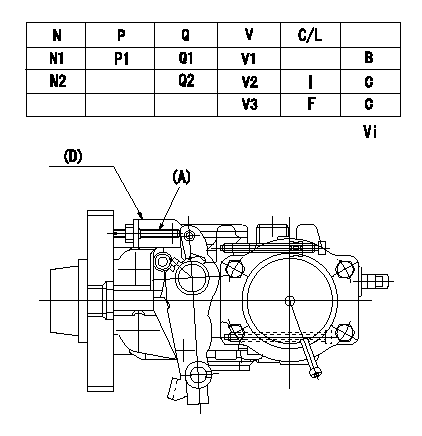Information injection-pump assembly
ZEXEL
104746-6605
1047466605
ISUZU
8971923304
8971923304

Rating:
Cross reference number
ZEXEL
104746-6605
1047466605
ISUZU
8971923304
8971923304
Zexel num
Bosch num
Firm num
Name
Calibration Data:
Adjustment conditions
Test oil
1404 Test oil ISO4113orSAEJ967d
1404 Test oil ISO4113orSAEJ967d
Test oil temperature
degC
45
45
50
Nozzle
105780-0060
Bosch type code
NP-DN0SD1510
Nozzle holder
105780-2150
Opening pressure
MPa
13
13
13.3
Opening pressure
kgf/cm2
133
133
136
Injection pipe
157805-7320
Injection pipe
Inside diameter - outside diameter - length (mm) mm 2-6-450
Inside diameter - outside diameter - length (mm) mm 2-6-450
Joint assembly
157641-4720
Tube assembly
157641-4020
Transfer pump pressure
kPa
20
20
20
Transfer pump pressure
kgf/cm2
0.2
0.2
0.2
Direction of rotation (viewed from drive side)
Left L
Left L
Timer measuring device installation position
Low pressure side LOW PRESSURE SIDE
Low pressure side LOW PRESSURE SIDE
Injection timing adjustment
Pump speed
r/min
500
500
500
Boost pressure
kPa
0
0
0
Boost pressure
mmHg
0
0
0
Average injection quantity
mm3/st.
60.5
60
61
Difference in delivery
mm3/st.
5
Basic
*
Oil temperature
degC
48
46
50
Remarks
NA
NA
Injection timing adjustment_02
Pump speed
r/min
800
800
800
Boost pressure
kPa
52
50.7
53.3
Boost pressure
mmHg
390
380
400
Average injection quantity
mm3/st.
67.4
66.9
67.9
Difference in delivery
mm3/st.
5.5
Basic
*
Oil temperature
degC
50
48
52
Remarks
CBS
CBS
Injection timing adjustment_03
Pump speed
r/min
800
800
800
Boost pressure
kPa
80
78.7
81.3
Boost pressure
mmHg
600
590
610
Average injection quantity
mm3/st.
76.8
76.3
77.3
Difference in delivery
mm3/st.
6
Basic
*
Oil temperature
degC
50
48
52
Remarks
Full
Full
Injection timing adjustment_04
Pump speed
r/min
500
500
500
Boost pressure
kPa
0
0
0
Boost pressure
mmHg
0
0
0
Average injection quantity
mm3/st.
60.5
59.5
61.5
Difference in delivery
mm3/st.
5
Basic
*
Oil temperature
degC
48
46
50
Remarks
NA
NA
Injection timing adjustment_05
Pump speed
r/min
800
800
800
Boost pressure
kPa
52
50.7
53.3
Boost pressure
mmHg
390
380
400
Average injection quantity
mm3/st.
67.4
66.4
68.4
Difference in delivery
mm3/st.
5.5
Basic
*
Oil temperature
degC
50
48
52
Remarks
CBS
CBS
Injection timing adjustment_06
Pump speed
r/min
800
800
800
Boost pressure
kPa
80
78.7
81.3
Boost pressure
mmHg
600
590
610
Average injection quantity
mm3/st.
76.8
75.8
77.8
Difference in delivery
mm3/st.
6
Basic
*
Oil temperature
degC
50
48
52
Remarks
Full
Full
Injection timing adjustment_07
Pump speed
r/min
1000
1000
1000
Boost pressure
kPa
80
78.7
81.3
Boost pressure
mmHg
600
590
610
Average injection quantity
mm3/st.
83.8
77.3
90.3
Oil temperature
degC
50
48
52
Injection timing adjustment_08
Pump speed
r/min
1250
1250
1250
Boost pressure
kPa
80
78.7
81.3
Boost pressure
mmHg
600
590
610
Average injection quantity
mm3/st.
91.5
85
98
Oil temperature
degC
50
48
52
Injection timing adjustment_09
Pump speed
r/min
1700
1700
1700
Boost pressure
kPa
80
78.7
81.3
Boost pressure
mmHg
600
590
610
Average injection quantity
mm3/st.
105.7
99.2
112.2
Oil temperature
degC
50
48
52
Injection quantity adjustment
Pump speed
r/min
2075
2075
2075
Boost pressure
kPa
80
78.7
81.3
Boost pressure
mmHg
600
590
610
Average injection quantity
mm3/st.
34
31
37
Difference in delivery
mm3/st.
7
Basic
*
Oil temperature
degC
52
50
54
Injection quantity adjustment_02
Pump speed
r/min
2075
2075
2075
Boost pressure
kPa
80
78.7
81.3
Boost pressure
mmHg
600
590
610
Average injection quantity
mm3/st.
34
31
37
Difference in delivery
mm3/st.
7
Basic
*
Oil temperature
degC
52
50
54
Injection quantity adjustment_03
Pump speed
r/min
2300
2300
2300
Boost pressure
kPa
80
78.7
81.3
Boost pressure
mmHg
600
590
610
Average injection quantity
mm3/st.
3
Oil temperature
degC
52
50
54
Governor adjustment
Pump speed
r/min
375
375
375
Boost pressure
kPa
0
0
0
Boost pressure
mmHg
0
0
0
Average injection quantity
mm3/st.
13.9
11.9
15.9
Difference in delivery
mm3/st.
2
2
2
Basic
*
Oil temperature
degC
48
46
50
Governor adjustment_02
Pump speed
r/min
375
375
375
Boost pressure
kPa
0
0
0
Boost pressure
mmHg
0
0
0
Average injection quantity
mm3/st.
13.9
11.9
15.9
Difference in delivery
mm3/st.
2
2
2
Basic
*
Oil temperature
degC
48
46
50
Timer adjustment
Pump speed
r/min
100
100
100
Boost pressure
kPa
0
0
0
Boost pressure
mmHg
0
0
0
Average injection quantity
mm3/st.
60
60
100
Basic
*
Oil temperature
degC
48
46
50
Remarks
Full
Full
Timer adjustment_02
Pump speed
r/min
100
100
100
Boost pressure
kPa
0
0
0
Boost pressure
mmHg
0
0
0
Average injection quantity
mm3/st.
60
60
100
Oil temperature
degC
48
46
50
Remarks
Full
Full
Speed control lever angle
Pump speed
r/min
375
375
375
Boost pressure
kPa
0
0
0
Boost pressure
mmHg
0
0
0
Average injection quantity
mm3/st.
0
0
0
Oil temperature
degC
48
46
50
Remarks
Magnet OFF at idling position
Magnet OFF at idling position
0000000901
Pump speed
r/min
1350
1350
1350
Boost pressure
kPa
80
78.7
81.3
Boost pressure
mmHg
600
590
610
Overflow quantity
cm3/min
1240
1010
1470
Oil temperature
degC
50
48
52
Stop lever angle
Pump speed
r/min
1350
1350
1350
Boost pressure
kPa
80
78.7
81.3
Boost pressure
mmHg
600
590
610
Pressure
kPa
471
442
500
Pressure
kgf/cm2
4.8
4.5
5.1
Basic
*
Oil temperature
degC
50
48
52
Stop lever angle_02
Pump speed
r/min
1020
1020
1020
Boost pressure
kPa
80
78.7
81.3
Boost pressure
mmHg
600
590
610
Pressure
kPa
353
314
392
Pressure
kgf/cm2
3.6
3.2
4
Oil temperature
degC
50
48
52
Stop lever angle_03
Pump speed
r/min
1250
1250
1250
Boost pressure
kPa
80
78.7
81.3
Boost pressure
mmHg
600
590
610
Pressure
kPa
432
393
471
Pressure
kgf/cm2
4.4
4
4.8
Oil temperature
degC
50
48
52
Stop lever angle_04
Pump speed
r/min
1350
1350
1350
Boost pressure
kPa
80
78.7
81.3
Boost pressure
mmHg
600
590
610
Pressure
kPa
471
442
500
Pressure
kgf/cm2
4.8
4.5
5.1
Basic
*
Oil temperature
degC
50
48
52
Stop lever angle_05
Pump speed
r/min
1500
1500
1500
Boost pressure
kPa
80
78.7
81.3
Boost pressure
mmHg
600
590
610
Pressure
kPa
510
471
549
Pressure
kgf/cm2
5.2
4.8
5.6
Oil temperature
degC
50
48
52
Stop lever angle_06
Pump speed
r/min
1800
1800
1800
Boost pressure
kPa
80
78.7
81.3
Boost pressure
mmHg
600
590
610
Pressure
kPa
608
569
647
Pressure
kgf/cm2
6.2
5.8
6.6
Oil temperature
degC
50
48
52
0000001101
Pump speed
r/min
1350
1350
1350
Boost pressure
kPa
80
78.7
81.3
Boost pressure
mmHg
600
590
610
Timer stroke
mm
1.8
1.6
2
Basic
*
Oil temperature
degC
50
48
52
_02
Pump speed
r/min
1020
1020
1020
Boost pressure
kPa
80
78.7
81.3
Boost pressure
mmHg
600
590
610
Timer stroke
mm
0.5
Oil temperature
degC
50
48
52
_03
Pump speed
r/min
1350
1350
1350
Boost pressure
kPa
80
78.7
81.3
Boost pressure
mmHg
600
590
610
Timer stroke
mm
1.8
1.6
2
Basic
*
Oil temperature
degC
50
48
52
_04
Pump speed
r/min
1500
1500
1500
Boost pressure
kPa
80
78.7
81.3
Boost pressure
mmHg
600
590
610
Timer stroke
mm
3
2.6
3.4
Oil temperature
degC
50
48
52
_05
Pump speed
r/min
1800
1800
1800
Boost pressure
kPa
80
78.7
81.3
Boost pressure
mmHg
600
590
610
Timer stroke
mm
4.5
4.2
4.9
Oil temperature
degC
50
48
52
0000001201
Max. applied voltage
V
8
8
8
Test voltage
V
13
12
14
Timing setting
K dimension
mm
3.6
3.5
3.7
KF dimension
mm
7.76
7.66
7.86
MS dimension
mm
0.5
0.4
0.6
BCS stroke
mm
2.6
2.4
2.8
Pre-stroke
mm
0.2
0.18
0.22
Control lever angle alpha
deg.
18
14
22
Control lever angle beta
deg.
39
34
44
Test data Ex:
0000001601 BOOST COMPENSATOR ADJUSTMENT

BCS adjustment procedure
1. At full boost pressure, set so that the full injection quantity is within the specifications (adjusting point).
2. Perform boost compensator intermediate operation point adjustment (pump speed N1, boost pressure P1).
3. When injection quantity at boost pressure P2 and pump speed N2 is not as specified, loosen nut (A) and adjust position of screw (B) so that injection quantity is as specified. The screw position should be within +-1 turn of initial position.
4. The nut tightening torque is T.
----------
N1=800r/min N2=500r/min P1=52.0kPa(390mmHg) P2=0kPa(0mmHg) T=6~9N-m(0.6~0.9kgf-m)
----------
SW=10mm T=6~9N-m(0.6~0.9kgf-m)
----------
N1=800r/min N2=500r/min P1=52.0kPa(390mmHg) P2=0kPa(0mmHg) T=6~9N-m(0.6~0.9kgf-m)
----------
SW=10mm T=6~9N-m(0.6~0.9kgf-m)
0000001801 POTENTIOMETER ADJUSTMENT

Potentiometer adjusting specifications (oval)
N:Pump speed
Q:Injection quantity
P:Boost pressure
V:Output voltage
C/L: control lever position
I:Idle
F:Full lever position
B:Adjusting point
C:Checking point
D:Bracket (shape may differ)
Adjusting method (applied voltage Vi, dummy bolt method)
1. Hold the dummy bolt (A) against the control lever at position N = N1 and Q = Q1 and fix using the lock nut.
2. At potentiometer adjustment, with the control lever contacting the dummy bolt, adjust the potentiometer so that the output voltage is V1.
3. After completing adjustment, remove the dummy bolt (A) and confirm that the potentiometer output voltage is within the adjustment specifications when the control lever is in the idle position.
(A): Dummy bolt and nut part number 146526-3300 (bolt) corresponding to 42 (mm).
Corresponding to 013020-6040 (nut)
----------
N1=1080r/min Q1=27.5+-1.0mm3/st V1=3.56+-0.03V Vi=10V
----------
N1=1080r/min N2=375r/min P1=0kPa(0mmHg) Q1=27.5+-1.0mm3/st Q2=13.9+-2.0mm3/st V1=3.56+-0.03V V2=(0.93+-0.45V) V3=(7.43+-0.83V)
----------
N1=1080r/min Q1=27.5+-1.0mm3/st V1=3.56+-0.03V Vi=10V
----------
N1=1080r/min N2=375r/min P1=0kPa(0mmHg) Q1=27.5+-1.0mm3/st Q2=13.9+-2.0mm3/st V1=3.56+-0.03V V2=(0.93+-0.45V) V3=(7.43+-0.83V)
Information:
Fuel System Information
Use only fuel as recommended in this section.
Fill the fuel tank at the end of each day of operation to drive out moist air and to prevent condensation. Do not fill the tank to the top. Fuel expands as it gets warm and may overflow. Do not fill the fuel filters with fuel before installing them. Contaminated fuel will cause accelerated wear to the fuel system parts.
Fuel Tanks
Drain the water and sediment from any fuel storage tank weekly, at the oil change period, and before it is refilled. This will help prevent water and/or sediment from being pumped from the fuel storage tank into the engine fuel tank.Fuel tanks should contain some provision for draining water and sediment from the bottom of the fuel tanks. Some fuel tanks use supply pipes that allow water and sediment to settle below the end of the fuel supply pipe. This water and sediment should be drained at each oil change. Do not use fuel tanks with supply lines that take fuel directly from the bottom of the tank.Fuel Lines
The fuel return line should deposit fuel at the top of the tank opposite the supply connection. This allows the engine to get warm (not hot) fuel from the tank. It also allows air to escape from the return fuel without being pulled back into the engine. If hot fuel must return to the tank, a fuel cooler is required.Avoid sharp angles and use as few fittings and connections as possible. Moisture in the fuel will tend to collect and freeze at low points in the fuel lines. Fuel lines should travel the most direct route to the engine compartment.Do not use galvanized fittings in the fuel lines. Size fuel lines so they do not exceed maximum fuel transfer pump inlet restriction and fuel return line restriction specifications.Fuel Filters
A primary fuel filter and/or water separator is recommended and should be installed between the fuel tank and the engine fuel inlet.After changing the fuel filter(s), always prime the fuel system (if equipped with a priming pump) to remove air bubbles from the system.Fuel Recommendations
Caterpillar Diesel Engines are capable of burning a wide range of distillate fuels. The use of clean, stable blends of distillate fuel which meet the following requirements will provide quality engine service life. The fuels recommended for use in Caterpillar engines are normally No.2-D diesel fuel and No.2 fuel oil, although No. 1 grades are acceptable. The following fuel specifications are some of the worldwide fuels which also meet the requirements. The following fuel characteristics should be considered when procuring fuel for use in Caterpillar diesel engines.Cetane Number
The minimum cetane number required for average starting conditions for the direct injection engine is 40. A higher cetane value may be required for high altitude operation or cold weather starting.Filterability
Clean fuels should have no more than 0.1% of sediment and water. Storage of fuel for extended periods of time can cause fuel oxidation with solids forming, causing filtering problems.Pour Point
The pour
Use only fuel as recommended in this section.
Fill the fuel tank at the end of each day of operation to drive out moist air and to prevent condensation. Do not fill the tank to the top. Fuel expands as it gets warm and may overflow. Do not fill the fuel filters with fuel before installing them. Contaminated fuel will cause accelerated wear to the fuel system parts.
Fuel Tanks
Drain the water and sediment from any fuel storage tank weekly, at the oil change period, and before it is refilled. This will help prevent water and/or sediment from being pumped from the fuel storage tank into the engine fuel tank.Fuel tanks should contain some provision for draining water and sediment from the bottom of the fuel tanks. Some fuel tanks use supply pipes that allow water and sediment to settle below the end of the fuel supply pipe. This water and sediment should be drained at each oil change. Do not use fuel tanks with supply lines that take fuel directly from the bottom of the tank.Fuel Lines
The fuel return line should deposit fuel at the top of the tank opposite the supply connection. This allows the engine to get warm (not hot) fuel from the tank. It also allows air to escape from the return fuel without being pulled back into the engine. If hot fuel must return to the tank, a fuel cooler is required.Avoid sharp angles and use as few fittings and connections as possible. Moisture in the fuel will tend to collect and freeze at low points in the fuel lines. Fuel lines should travel the most direct route to the engine compartment.Do not use galvanized fittings in the fuel lines. Size fuel lines so they do not exceed maximum fuel transfer pump inlet restriction and fuel return line restriction specifications.Fuel Filters
A primary fuel filter and/or water separator is recommended and should be installed between the fuel tank and the engine fuel inlet.After changing the fuel filter(s), always prime the fuel system (if equipped with a priming pump) to remove air bubbles from the system.Fuel Recommendations
Caterpillar Diesel Engines are capable of burning a wide range of distillate fuels. The use of clean, stable blends of distillate fuel which meet the following requirements will provide quality engine service life. The fuels recommended for use in Caterpillar engines are normally No.2-D diesel fuel and No.2 fuel oil, although No. 1 grades are acceptable. The following fuel specifications are some of the worldwide fuels which also meet the requirements. The following fuel characteristics should be considered when procuring fuel for use in Caterpillar diesel engines.Cetane Number
The minimum cetane number required for average starting conditions for the direct injection engine is 40. A higher cetane value may be required for high altitude operation or cold weather starting.Filterability
Clean fuels should have no more than 0.1% of sediment and water. Storage of fuel for extended periods of time can cause fuel oxidation with solids forming, causing filtering problems.Pour Point
The pour